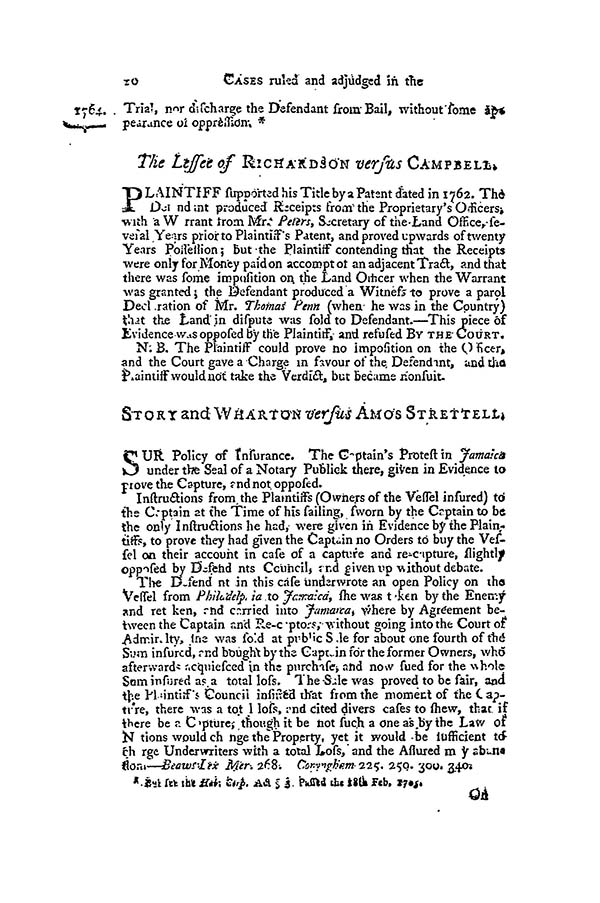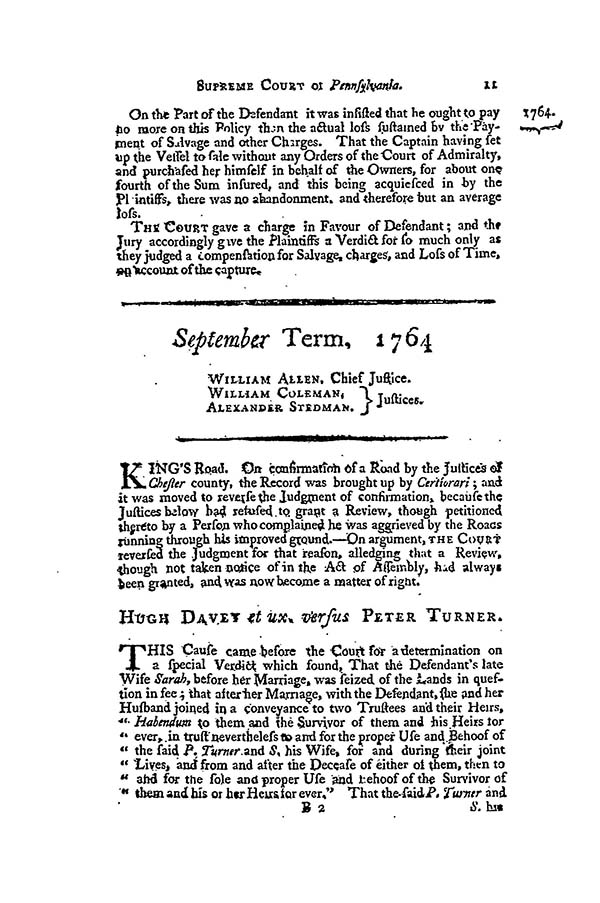Lessee of Richardson v. Campbell, 1 Dall. 10 (Pa. 1764) and Story and Wharton v. Strettell, 1 Dall. 10 (Pa. 1764)
Supreme Court of Pennsylvania
April Term, 1764.
The Lessee of Richardson versus Campbell
Plaintiff supported his Title by a Patent dated in 1762. The Defendant produced Receipts from the Proprietary's Officers, with a Warrant from Mr. Peters, Secretary of the Land Office, several Years prior to Plaintiff's Patent, and proved upwards of twenty Years Possession; but the Plaintiff contending that the Receipts were only for Money paid on accompt of an adjacent Tract, and that there was some imposition on the Land Officer when the Warrant was granted; the Defendant produced a Witness to prove a parol Declaration of Mr. Thomas Penn (when he was in the Country) that the Land in dispute was sold to Defendant.—This piece of Evidence was opposed by the Plaintiff, and refused By the Court.
N.B. The Plaintiff could prove no imposition on the Officer, and the Court gave a Charge in favour of the Defendant, and the Plaintiff would not take the Verdict, but became nonsuit.
Citation: Lessee of Richardson v. Campbell, 1 U.S. 10, 1 Dall. 10 (Pa. 1764)
Story and Wharton versus Amos Strettell.
Sur Policy of Insurance. The Captain's Protest in Jamaica under the Seal of a Notary Publick there, given in Evidence to prove Capture, and not opposed.
Instructions from the Plaintiffs (Owners of the Vessel insured) to the Captain at the Time of his failing, sworn by the Capitain to be the only Instructions he had, were given in Evidence by the Plaintiffs, to prove they had given the Captain no Orders to buy the Vessel on their account in case of a capture and re-capture, slightly opposed by Defendants Council, and given up without debate.
The Defendant in this case underwrote an open Policy on the Vessel from Philadelphia to Jamaica, where by Agreement between the Captain and Re-captors, without going into the Court of Admiralty, she was sold at public Sale for about one fourth of the Sum insured, and brought by the Captain for the former Owners, who afterwards acquiesced in the purchase, and now sued for the whole Sum insured as a total loss. The Sale was proved to be fair, and the Plaintiff's Council insured that from the moment of the Capture, there was a total loss, and cited divers cases to shew, that if there be a Capture, though it be such a one as by the Law of Nations would change the Property, yet it would be sufficient to charge Underwriters with a total Loss, and the Assured may abandon.—Beaws Lex Mer. 268. Conyngham 225. 259. 300. 340.
On the Part of the Defendant it was insisted that he ought to pay no more on this Policy than the actual loss sustained by the Payment of Salvage and other Charges. That the Captain having set up the Vessel to sale without any Orders of the Court of Admiralty, and purchased her himself in behalf of the Owners, for about one fourth of the Sum insured, and this being acquiesced in by the Plaintiffs, there was no abandonment, and therefore but an average loss.
The Court gave a charge in Favour of Defendant; and the Jury accordingly gave the Plaintiffs a Verdict for so much only as they judged a compensation for Salvage, charges, and Loss of Time, on account of the capture.
Citation: Story and Wharton v. Strettell, 1 U.S. 10, 1 Dall. 10 (Pa. 1764)


Last modified: December 5, 2014